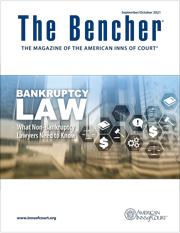Delaware Supreme Court Limits Trial Court’s Power to Impose Sanctions for Unprofessional Conduct
The Bencher—September/October 2021
By Francis G.X. Pileggi, Esquire

 The Delaware Supreme Court recently reiterated that it retains exclusive authority to regulate the conduct of attorneys in Delaware and that trial courts in Delaware do not have the authority to enforce the rules of professional conduct—with a few exceptions. In Hunt v. Court of Chancery, Del. Supr., No. 233, 2020, Order (June 10, 2021), Delaware’s High Court reversed a trial court’s decision that imposed sanctions for an unprofessional email that was sent between counsel. Although these sanctions were imposed on a Texas attorney appearing pro hac vice, the limited scope of this short ethics column highlights the principles related to regulation of attorney conduct discussed in this recent Supreme Court Order and does not address the standards, covered in one or more of these ethics columns over the past 20 years, that determine when a pro hac vice admission in Delaware may be revoked.
The Delaware Supreme Court recently reiterated that it retains exclusive authority to regulate the conduct of attorneys in Delaware and that trial courts in Delaware do not have the authority to enforce the rules of professional conduct—with a few exceptions. In Hunt v. Court of Chancery, Del. Supr., No. 233, 2020, Order (June 10, 2021), Delaware’s High Court reversed a trial court’s decision that imposed sanctions for an unprofessional email that was sent between counsel. Although these sanctions were imposed on a Texas attorney appearing pro hac vice, the limited scope of this short ethics column highlights the principles related to regulation of attorney conduct discussed in this recent Supreme Court Order and does not address the standards, covered in one or more of these ethics columns over the past 20 years, that determine when a pro hac vice admission in Delaware may be revoked.
There are two key takeaways from the Delaware Supreme Court ruling in this matter:
- The Delaware Supreme Court retains exclusive authority to supervise the practice of law in Delaware and to enforce the Delaware Lawyers’ Rules of Professional Conduct. See In re Appeal of Infotechnology, Inc. 582 A.2d 215, 220 (Del. 1990); Crumplar v. Superior Court, 56 A.3d 1000, 1009 (Del. 2012).
- Due process requires that before a court may impose sanctions such as a monetary penalty, it is required to give an opportunity to the recipient of the sanctions to respond both in writing and orally.
Background Facts
The basic facts involved in this matter begin with an email sent between counsel only, and not directed to the court, which according to the Delaware Supreme Court was “more angry, insulting, and false bravado than a real threat of physical violence. The unprofessional conduct was also not repetitive and did not affect the proceedings before the court.” Nonetheless, the recipient of the email submitted a copy of it to the trial court, along with a request for sanctions to be imposed. After ruling on a separate motion, without giving the offending attorney an opportunity to present argument, the trial court imposed as a sanction the fees incurred by opposing counsel in connection with addressing the unprofessional email, without revoking the pro hac vice admission, however. The trial court found that the email between counsel was prejudicial to the administration of justice and a violation of Delaware Lawyers’ Rule of Professional Conduct 8.4(d). The Supreme Court disagreed.
Analysis
Delaware’s High Court quoted from a prior decision that clarified the boundary line between the exclusive jurisdiction of the Supreme Court over enforcement of the Delaware Lawyers’ Rules of Professional Conduct and the authority of the trial court in connection with related matters:
“While we recognize and confirm a trial court’s power to ensure the orderly and fair administration of justice in matters before it, including the conduct of counsel, the Delaware Lawyers’ Rules of Professional Conduct may not be applied in extra-disciplinary proceedings solely to vindicate the legal profession’s concerns in such affairs. Unless the challenged conduct prejudices the fairness of the proceedings, such that it adversely affects the fair and efficient administration of justice, only this Court has the power and responsibility to govern the Bar, and pursuant to that authority to enforce the Rules for disciplinary purposes.”
The Court further explained the difference between its sole authority on those matters and the inherent authority of the trial court by emphasizing that:
“Absent conduct that prejudicially disrupts the proceedings, trial judges have no independent jurisdiction to enforce the Rules of Professional Conduct. Instead, trial courts may pursue their concerns in deterring future troublesome conduct by reporting attorneys to the Office of Disciplinary Counsel [an arm of the Supreme Court] where the facts merit the referral. This…prevents wasteful, duplicative, and potentially inconsistent enforcement of the Rules of Professional Conduct.”
The Delaware Supreme Court also emphasized that before imposing sanctions under Rule 11, trial judges are required to provide a “reasonable opportunity to respond [which] should include an opportunity for the attorney to present evidence and respond orally before the court…and the judge should provide this hearing even if the attorney fails to request it.”
In the instant matter, the trial court did not provide the attorney on whom fees were imposed with advance notice and an opportunity to be heard. The Supreme Court also underscored that notice and an opportunity to be heard are not limited to Rule 11 sanctions.
Although the Delaware Supreme Court did not condone the unprofessional emails, the court reasoned that the isolated email did not have an impact of the administration of justice. To hold otherwise would lead to every request for sanctions in litigation grounded in an ethical violation invoking the jurisdiction of the trial court.
The court also recognized that trial courts “retain their traditional powers, which are indeed potent, to address, rectify, and punish conduct of a party or counsel which threatens the legitimacy of judicial proceedings.” Moreover, the court added that trial courts have “full power to employ the substantive and procedural remedies available to properly control the parties and counsel before it and to ensure the fairness of the proceedings.”
In summary, notwithstanding the disapproval of unprofessional conduct, this ruling clarifies who has the power to penalize certain conduct of attorneys and how those issues should be addressed.
Francis G.X. Pileggi, Esquire, is the managing partner of the Delaware office of Lewis Brisbois Bisgaard & Smith LLP and the primary author of the Delaware Corporate and Commercial Litigation Blog at www.delawarelitigation.com.